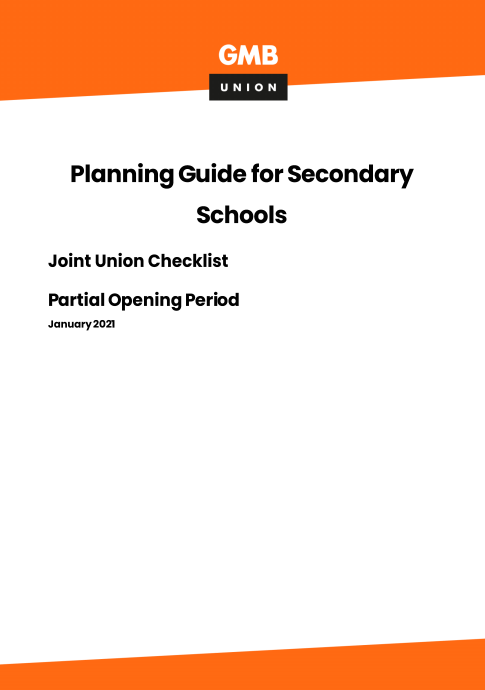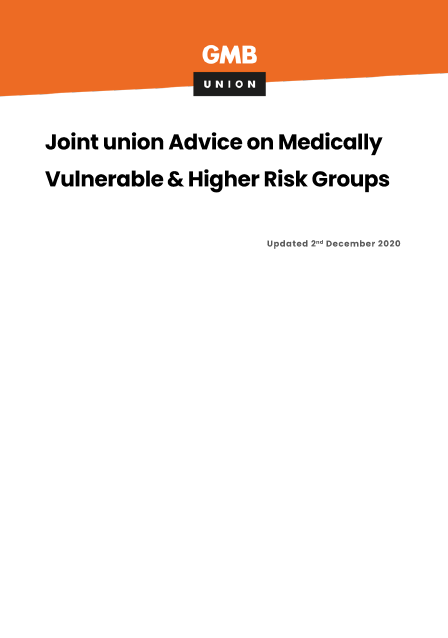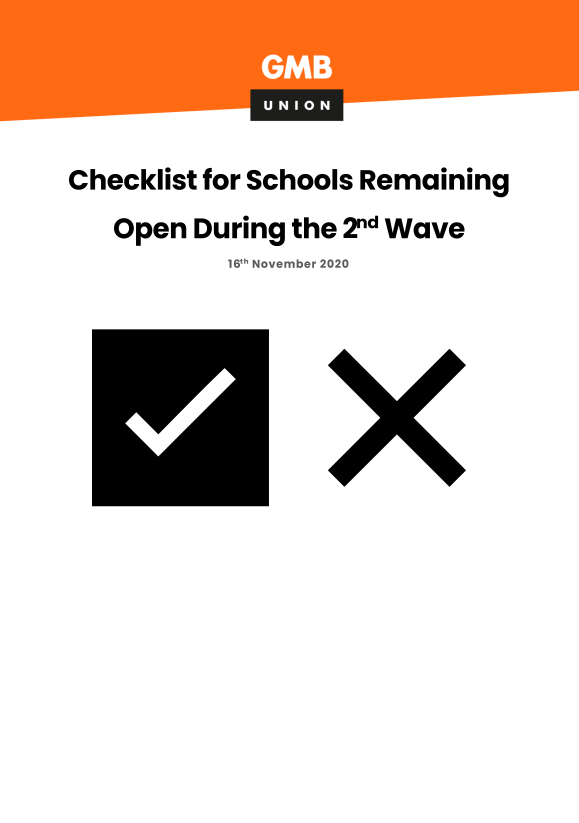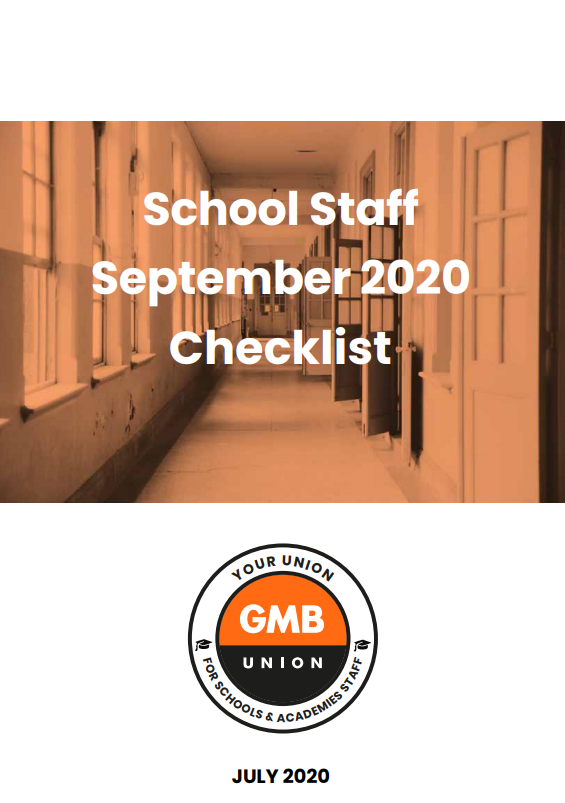Noticeboard Bulletin - 06-01-2021
Posted on:
GMB believes that the Government’s failure to provide clear guidance for staff in special schools is unacceptable.
As your union, we know that the risk of transmission to staff in special schools is often higher than in mainstream settings. GMB has explained this reality to the Department for Education, and we have written to the DfE to urge Ministers to publish fresh guidance in consultation with workers in special schools.
The below information summarises the latest official guidance for schools in England. If new information becomes available then it will be communicated to you. All information is correct as of Wednesday 6th January.
Are special schools required to be open?
The Department for Education said on social media (Tuesday 05 January) that ‘special schools will remain open’.
The formal guidelines are more complicated. The Government has said that only the children of critical workers, and ‘vulnerable’ children or young people, should attend school. The current definition of ‘vulnerable’ children includes those with an Education, Health and Care Plan (EHCP).
In practice, this includes almost all pupils in special schools. 98% of pupils in state special schools have an EHCP, according to DfE statistics. All children in special schools are required to have an EHCP, unless a limited number of ‘exceptional circumstances’ apply (SEND Code of Practice 2015, section 1.29).
Therefore, under current guidance, a small minority of children in special schools may not be technically classed as ‘vulnerable.’ However, education providers and local authorities could choose to classify pupils who do not have an EHCP as ‘vulnerable’ under the current guidelines.
What is the official advice on when special schools should be open?
Official advice published on New Year’s Eve stated that special schools ‘have the option of agreeing with parents that individual pupils can stay at home’ this week on a case by case basis. The DfE said that families would need to request an authorised period of absence this week.
The advice went on to say that ‘the aim should be that all pupils in special schools and AP are back in school by the second week of term (on or after 11 January 2021).’
This advice has not been updated following the imposition of new lockdown restrictions. GMB has written to the DfE and called for new advice to be issued that takes account of the changes over the last few days.
Have EHCP entitlements changed?
At the time of writing, no changes to EHCP entitlements have been made in 2021.
In the Spring of 2020, the Government introduced new regulation that ‘relaxed’ local authorities’ duty to meet the requirements of individual pupils’ EHCPs. The absolute duty was replaced by a requirement to make ‘reasonable endeavours’ to fulfil EHCP entitlements.
The ‘relaxation’ was allowed to expire in the Summer of 2020. GMB recognises that in some cases the entitlements listed in EHCPs may be in conflict with the support that schools are realistically able to provide at the present time. GMB has taken up this issue with the DfE, and if issues arise with individual EHCPs then you should raise it with your GMB branch.
Other issues
GMB believes that action and official guidance is needed on a number of additional issues that directly affect many special schools. Examples include loss of access to NHS services, the lack of funding for specialist adapted IT devices, and transport difficulties.
We continue to engage with employers and the Department for Education on these and other issues to represent your voices when decisions are made.
EARLY YEARS
GMB Union continues to press Government to close nurseries and pre-schools to all but key workers and vulnerable children.
We commend the local campaign carried out by GMB Sussex branch reps in getting Brighton and Hove Council to do this.
SAFE SYSTEMS OF WORK
GMB will never play fast and loose with the security of your jobs and whilst most of the country moves into another lock-down we still need to ensure schools that remain open for key workers and vulnerable pupils are safe.
GMB have taken the decision that the best way we can protect you is by asking you to issue: Letter 1 first (Request for a Revised Risk Assessment) then Letter 2 (Working from Home letter if you feel unsafe).
Request for a Revised Risk Assessment
Working from Home letter if you feel unsafe
This two-stage letter process will help to build added protection for you against disciplinary and dismissal.
Letter 1 seeks a revised risk assessment and if this is insufficient you are better protected to raise the H&S breaches to tell your employer why you feel unsafe and want to work from home.
PAY TERMS AND CONDITIONS
The National Joint Council for Local Government Services has confirmed that agreements set out at the start of the Pandemic in March 2020 in relation to those members working in Local Authority Schools will apply to the current lockdown period. You can find the relevant NJC circulars here.
GMB negotiated these agreements with Local Government Employers on behalf of members at the start of the Pandemic and believe these are ‘best in class’ in terms of members safety and protection.
STAY CONNECTED
- Contact your local GMB rep if you are worried about your safety at work
- If you do not have a workplace rep on-site consider becoming one
- Pass this briefing to a non-union member and ask them to join
- Stay in touch with us join our GMB Schools group on Facebook and join our mailing list by emailing us at schools@gmb.org.uk
- Join a GMB virtual meeting - we arrange these on a weekly basis and will post details on our social media accounts.
Date: 20/01/2021
COVID-19 ABSENCE RATES HIGHER FOR SCHOOL SUPPORT STAFF THAN TEACHERS, GMB ANALYSIS SHOWS
Throughout the pandemic your union has been raising concerns that our members are disproportionately being exposed to the Covid virus.
School support staff make up 2/3 of the total education workforce and have been on the frontline in every classroom and every school across the country throughout the pandemic.
Vaccine access must be ‘urgent priority’ as official figures show 33,000 support staff workers absent due to Covid in December
GMB, the union for school support staff, has called for urgent occupational priority for vaccination for school workers as new figures show that more support staff workers were more likely to be absent from work due to covid-19 than teachers.
The figures, which cover schools in England only, were published by the Department for Education (DfE) this week.
A total of 33,267 school support staff were absent on 17 December 2020 for covid-19 related reasons, including confirmed and suspected infections and those who were required to isolate due to exposure inside or outside school.
GMB has long said that support staff workers were at the highest occupational exposure to Covid-19 in schools, as common tasks include administration of medicine, supporting children one to one, food, personal care together with close pupil contact whilst supporting learning.
SCHOOL SUPPORT STAFF ARE THE BACK BONE OF EVERY SCHOOL AND IT’S TIME SCHOOLS ARE MADE SAFE FOR THEM.
- An estimated 6.1 per cent of school support staff were absent on December 2020 due to Covid-19.
- This compared to 4.4 per cent of teachers and school leaders.
- Covid-19 absences have been higher for support staff than teachers on every day recorded by the DfE (since 12 October 2020).
The disparity was even greater in Special Schools, where 16.2 per cent of support staff were absent in December 2020 for reasons linked to covid-19 (compared to 5.4 per cent of teachers and school leaders).
|
The DfE has said that it believes that teachers and support staff should receive occupational priority for phase two of the vaccination programme. However, no official decision has been made, and Joint Committee on Vaccination and Immunisation advice on occupational prioritisation only mentions teachers. GMB is campaigning for all school workers to have access to vaccination. |
GMB RESPONSE
Rehana Azam, GMB National Secretary, said:
Schools cannot function without support staff, and these figures confirm that these critical workers are not getting the support they deserve.
It is not a coincidence that whilst many teachers are teaching remotely from home, lots of GMB members remain in schools, supervising classes, preparing food and maintaining school buildings.
Many of our members are performing tasks that involve a high risk of transmission, without adequate PPE, and often in poorly ventilated buildings.
Support staff are the highly skilled professionals of the education system but too often they are ignored in public debate.
The comments from Deputy Chief Medical Officer Jenny Harries to Parliament yesterday did not reflect at all the reality on the ground.
The DFE’s own statistics prove this. Ministers across Government need to wake up and recognise the reality that hundreds of thousands of low-paid school workers are at high risk of infection, with devastating consequence for workers, pupils and the wider community.”
The reality is that without urgent priority access to vaccinations for school support staff, the cycle of community transmission in schools will not be broken.
You can read the full GMB Press response here.
ANOTHER DAY AND ANOTHER U-TURN
WELL DONE TO GMB MEMBERS WHO STOOD FIRM ON THIS
Daily Contact testing within schools is paused!
In a statement Dept of Education said:
In light of this changing situation, we now recommend that the rollout of daily contact testing within schools is paused, other than for schools involved in further evaluation. This will enable the further detailed evaluation of changing circumstances including, potentially, lower infection rates and modelling work required to understand the benefits of daily contact testing in this new phase of the pandemic.




